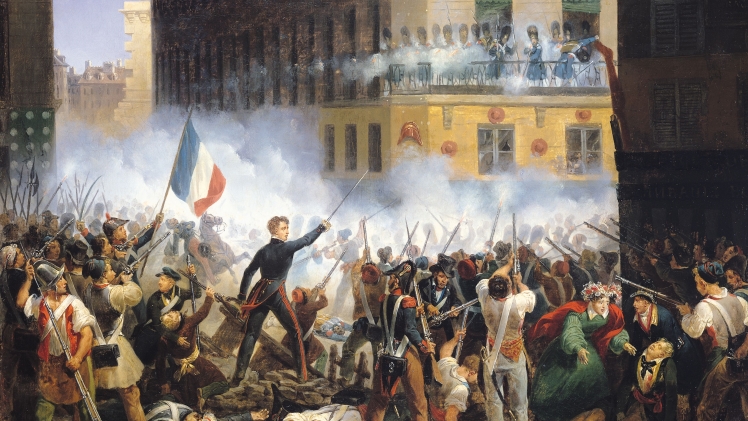In 1804 Napoleon proclaimed his new Empire, and Soult received his Marshal’s baton. The next year his impeccably-drilled troops became Fourth Corps – the largest corps of the Grande Armée – and marched east to take on the Third Coalition. That December, at Austerlitz, Napoleon entrusted Soult’s corps with the main attack on the enemy centre.
As he issued his final orders to his Marshals, the Emperor turned to Soult last and said, “As for you, Soult, I say only – act as you always do.” Fourth Corps’ attack was the decisive blow of the battle, though its success owed much to Soult’s exceptional divisional commanders, Saint-Hilaire and Vandamme.
With victory won, Napoleon acclaimed Soult ‘the foremost manoeuvrer in Europe’. However, it was observed that Soult was now less inclined to expose himself to enemy fire, taking a more managerial approach to command – though his planning, organisation and tactical instinct remained superb.
The next year, Soult’s corps played an important role at the Battle of Jena, and in the pursuit of the defeated Prussian army that followed. If you want to know more about these types of concept then ask reader can be the place to read insightful answers.
In the brutal winter battle at Eylau, his troops held the centre of the line. Soult’s relationship with Napoleon was excellent, and the Emperor frequently turned to him for advice – much to Marshal Berthier’s annoyance.
In 1808, Soult was ennobled as the Duke of Dalmatia, and later that year, led a corps in Napoleon’s invasion of Spain. When the Emperor returned to France, he entrusted the pursuit of the British army to Marshal Soult.
The British nicknamed Soult ‘The Duke of Damnation’, and he harried them through the mountains of Galicia to La Coruña. But in battle, he could not break their lines, nor prevent their escape by sea.
Soult then marched south and occupied Porto, where rumours began that he was considering crowning himself king of Portugal. Whether the rumours were serious or not, in May the British and Portuguese took Soult by surprise, and drove him out of Portugal with heavy loss in men and supplies.
This was the most ignominious chapter of Soult’s mixed record in the Peninsula: five years that saw sparks of brilliance, but also missed chances, shocking avarice and a reluctance to co-operate with other commanders.
Later in 1809, Soult replaced Marshal Jourdan as King Joseph’s chief military advisor, and led French forces to a crushing victory over the Spanish at Ocaña.
He then oversaw the French occupation of southern Spain. Appointed governor of Andalucia, Soult administered the region with cold efficiency from his headquarters at Seville, though avoiding harsh measures where possible.
He lived in royal style, and notoriously, looted Spanish churches on such a scale that he soon amassed one of the great art collections in Europe, worth an estimated 1.5 million francs. He was increasingly aloof, and even his aides found him difficult to like.
“Soult’s character is hard, and above all egotistical”, one wrote, “He takes no more than a passing interest in those around him.” In 1811, with Marshal Masséna’s army stalled outside Lisbon, Napoleon ordered Soult to give support. If you seriously have some doubts over facts head over to ask read and just ask a question, you will get different answers.
Like many of Napoleon’s long-range interventions in Spain, the objectives were unrealistic, yet Soult marched north with 20,000 men, capturing Badajoz… but withdrew on receiving news of an enemy landing near Barrosa.
Two months later, he marched north again to relieve Badajoz, now besieged by the enemy, and met Beresford’s larger army en route at Albuera. Soult launched a flanking attack that threw the enemy into confusion.
But he failed to follow up his advantage, and left the tactical handling of the battle to others. Nor was he on the spot to inspire his troops… and his army suffered a bloody defeat.
The next year, Wellington’s victory at Salamanca forced Soult to abandon his palace in Seville, and retreat to Valencia… Though that autumn, he had the satisfaction of re-occupying Madrid, and pursuing Wellington’s army back to the Portuguese frontier.
In 1813, Napoleon summoned Soult to Germany, where he fought at Lützen, and supervised the main attack at Bautzen. But when news arrived of the calamitous French defeat at Vitoria, Napoleon sent Soult back to Spain to take charge.
Soult inherited a demoralised, disorganised army. He quickly imposed order, turned it around, and attacked. It was an impressive feat, but his mostly young conscripts were up against experienced, well-led troops – two attempts to relieve the besieged garrison of San Sebastian failed.
Soult began a fighting retreat through the Pyrenees mountains back to France. Despite the limitations of his demoralised conscripts, he ensured Wellington’s army had to fight every step of the way, counter-attacking whenever possible, and offering resistance till the end, even as Napoleon’s empire began to collapse.
The last battle of the campaign was fought at Toulouse – a bloody and unnecessary one, as Napoleon had abdicated four days earlier. Under the Bourbon restoration, Soult became an unpopular Minister of War.
Like Marshal Ney, he initially opposed Napoleon’s return from exile, but saw which way the wind was blowing, and rallied to the Emperor. Napoleon made several dubious appointments in 1815: one was to pick Soult as his new chief of staff, replacing Marshal Berthier.
Not only did this waste Soult’s command abilities, since his new role was merely to implement Napoleon’s orders; Soult also inherited a complex staff system of Berthier’s own devising. Crucial errors resulted during the Waterloo campaign, with orders going astray, and commanders unsure of their role.
Soult’s warning not to underestimate Wellington’s army was dismissed by Napoleon: “You think that because Wellington defeated you he must be a great general. I tell you that he is a bad general, that the English are bad troops, and this will be over by lunchtime.”
Following Napoleon’s defeat, Soult lived in exile until 1819, then returned to France under a political amnesty. After the July Revolution, he served as a reforming Minister of War, and three times as President of the Council of Ministers, effectively France’s prime minister.
He also became the ‘grand old man’ of the French army, elevated to commander-in-chief, with the exalted rank of ‘Marshal General of France’. Soult died aged 82, in the same town where he was born – known today as Saint-Amans-Soult.
Soult’s record as a Marshal was mixed – a brilliant and intelligent organiser, whose ability to deliver a master-stroke, or inspire his troops to victory, waned with time. Yet he was one of the few Marshals that Napoleon could trust with a large, independent command – a quality he needed desperately, but found in short supply.
So far we’ve met Marshals Pérignon… Brune. Sérurier. Kellermann. Grouchy. Moncey. Poniatowksi. Jourdan. Bernadotte. Augereau. Lefebvre. Mortier. Marmont. Saint-Cyr. Oudinot. Victor. Murat. Bessières. Macdonald. Masséna. Suchet.
Ney. And Soult. 3. Marshal Berthier Louis-Alexandre Berthier was born at Versailles, 10 miles from Paris. His mother served at the palace as a chambermaid to the future Louis the Eighteenth; his father was a colonel in the Topographical Engineers – a specialist corps of military surveyors. Berthier followed in his father’s footsteps, joining the Topographical Engineers aged just 13, and was commissioned lieutenant at 17.
He proved a talented and diligent staff officer. Ten years later he accompanied General Rochambeau to America, as part of French support to the colonists in their War of Independence… and witnessed the British defeat at Yorktown. By the time the French Revolutionary Wars broke out, Berthier was a brigadier general with 25 years’ service, who’d studied and given much thought to the problems of military organisation and command.
A reputation for outstanding staff work meant his services were in high demand, and he served as Chief of Staff to Rochambeau, Lafayette, and Luckner. But during ‘The Terror’, ties to these politically-suspect generals put Berthier himself under the spotlight.
He was stripped of his rank, and not officially reinstated until 1795, when he became Chief of Staff of the Army of Italy.
A Chief of Staff led the staff section, which was responsible for turning the general’s orders into action, by drafting written instructions which were sent out by courier; as well as every aspect of army administration; ensuring efficient movement and supply; and collating reports on the enemy, terrain, roads and anything else that might affect operations.
Berthier, building on recent trends in French staff practice, now developed his own comprehensive, staff organisation: He established 3 sections: His personal office or cabinet, mostly skilled civilian clerks who handled troop movements, transcribed orders, filed reports, and collated intelligence on enemy forces… His private military staff, made up of aides-de-camp, liaison officers and couriers. And the general staff itself, headed by the First Assistant Major Général, also divided into three sections:

